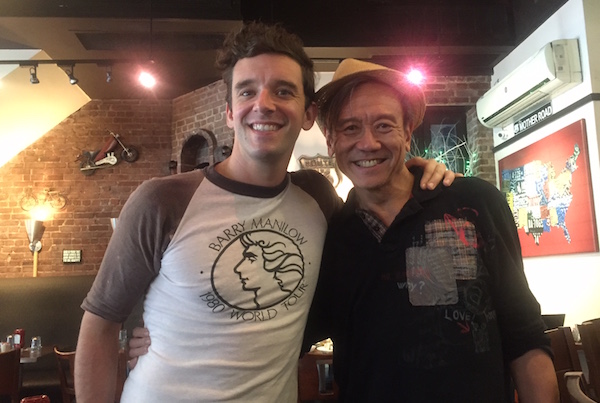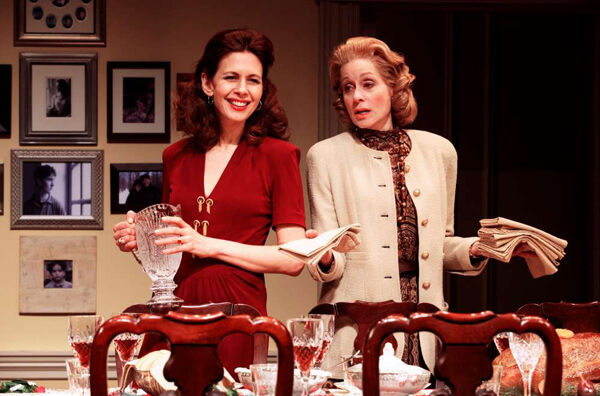Neil Patrick Harris in “Hedwig and the Angry Inch.” | JOAN MARCUS
BY DAVID KENNERLEY | Last week two shows examining the politics of gender identity opened on Broadway, yet they are polar opposites on nearly every level.
“Hedwig and the Angry Inch” is a rough-and-tumble rock musical in the vein of glam rock bands from the 1970s — think David Bowie or Iggy Pop — where androgyny, glitter, and gutsiness rule. A huge cult hit in 1998 at the Jane Street Theatre, it ran for two years and nabbed a slew of awards. The soundtrack was a bestseller, with Rolling Stone magazine crowing that “Hedwig” was “the first undeniably kick-ass rock musical.”
For the uninitiated, the exuberant musical traces the saga of a neglected “slip of a girlyboy” from communist East Berlin who had a botched sex-change operation before escaping to America and ending up in New York, in search of true love. Hedwig suffers from a series of bad choices and dashed dreams, namely, the failure to become a mega rocker like her ex-boyfriend, Tommy, who shot to stardom by ripping off her songs.
Two Broadway shows probe gender fluidity, but similarity ends there
As everybody knows by now, the central force behind this high-wattage revival is its gifted star, Neil Patrick Harris. His leggy Hedwig is a bundle of raw energy, threatening to explode at any moment (and sometimes he does). His vocals are pitch-perfect; every syllable is crisp and clear, even with the Germanic accent.
Not only does he bring the requisite yearning and angst to the “internationally ignored song stylist,” he adds fresh bursts of raunchy, often improvised, comic flair.
“You see, ladies and gentleman, the road is my home,” Hedwig says wistfully, with a twinkle in her eye. “And when I think of all the people I have come upon in my travels, I have to think about the people who have come upon me.”
Part of the dramatic tension stems from wondering if Harris can complete the 95-minute show in gold-spangled, six-inch stacked heel ankle boots without stumbling (I noticed only one unscripted slip, while he was cavorting on top of a car). Fans of his long-running “How I Met Your Mother” will be horrified or delighted or both.
In a rare move, the 40-year-old, out gay actor is flying without a net on this one — there’s no understudy. If he can’t go on, the show won’t go on. He invests his performance with a sweaty physicality and spontaneity. Truly spectacular.
A heady mix of rock concert and stand-up routine, this “Hedwig” is framed as a slapdash, one-off event at the Belasco Theatre, commandeering the stage when the resident show, “Hurt Locker: The Musical,” closed prematurely (go early to grab one of the leftover mock Playbills wickedly lampooning Broadway musicals written by Mike Albo and Amanda Duarte).
Hedwig’s band, called the Angry Inch and led by Justin Craig, is everything a glam rock band should be. It even features Hedwig’s husband, Yitzhak (a superb Lena Hall, recently of “Kinky Boots”), also a gender bender.
Amazingly, this is one downtown-to-uptown reboot that actually retains much of its scrappy grit. That’s partly due to the edgy book by John Cameron Mitchell and timeless, fervent music and lyrics by Stephen Trask. And director Michael Mayer works the same magic that made “American Idiot” and “Spring Awakening” such rowdy yet affecting powerhouse hits.
Arianne Phillips, who also designed the costumes for the 2001 “Hedwig” film, works wonders with denim, leather, mohair, fishnet, and latex. If there were a Best Wig and Make-Up Design category at the Tonys, Mike Potter would surely be a contender.
Hedwig’s monologue is filled with wry one-liners punctuated by a rim-shot, and it’s also laden with symbolism. In her quest to break boundaries and find her other half to make her whole, there is much talk about the Berlin Wall crumbling. Lucky for us, the fourth wall has also disappeared, and the engaging Harris takes advantage of this interplay at every opportunity, smooching theatergoers and even leading a sing-along where the audience follows the bouncing balls over supertitled lyrics. Naturally, the balls look like lopped-off testicles, presumably Hedwig’s.
Nick Westrate, John Cullum, Gabriel Ebert, and Tom McGowan” in “Casa Valentina.” | MATTHEW MURPHY
Harvey Fierstein’s first foray into non-musical playwrighting in over 30 years, “Casa Valentina,” lives at the other end of the gender-bending spectrum. The work is directed with elegant sensitivity by the masterful Joe Mantello, who has a raft of queer-themed works under his belt, including “The Pride,” “The Ritz,” “Take Me Out,” “Love! Valour! Compassion!,” and “Corpus Christi.”
The story centers on a group of men, all claiming to identify as heterosexual, who come to a tumbledown bungalow colony in the Catskills to “escape from routine” and dress and act like women. Transvestite was the accepted term of the day, at a time before cross-dressing came into popular parlance. Their behavior at that resort half a century ago, by the way, could have landed them in jail.
What makes this exceptional comic drama so fascinating is the variety of men portrayed within this largely ignored corner of society, each looking to fulfill an individual need. Some dress because they feel trapped in the wrong gendered body. Some get sexual gratification. Others are reliving a pivotal moment in their childhood where women’s clothes first lodged in their psyche. All of them get a thrill by lying to their wives and tasting forbidden fruit.
But the sisters in “The Sorority,” as some call it, occasionally bicker amongst themselves over issues like getting official recognition for their group and what pronouns to use.
The most gregarious of the bunch is Bessie (Tom McGowan, with expert comic timing), a rotund gal who loves to quote Oscar Wilde and dispense advice to the awkward newbie Jonathon (a marvelous Gabriel Ebert), who has never worn a dress in public before.
“A good friend will stab you in the front,” advises Bessie.
The resort’s intrepid proprietors are George (Patrick Page), who later emerges as Valentina, and his dutiful wife, Rita (Mare Winningham), who is starting to show cracks in her armor as supporter of George’s lifestyle. This weekend they have a distinguished visitor, Charlotte (Reed Birney), a publisher and activist from LA who announces that the Sorority is now a legally recognized nonprofit organization.
Not that it’s very good news. Since the designation requires members to provide a legal name and address, the sisters balk.
If “Casa Valentina” serves as a primer about a subculture that was then secret and maintains some of its stigma today (they see it as a very exclusive club, or a Shangri La), it also smashes some myths along the way. This particular group of men have little desire to be showy like lip-synching drag queens. It’s about becoming comfortable in their own skin. While wearing male attire, the men come across as stiff and stilted; in women’s attire, they seem self-possessed and at ease.
“Wear what makes you happy,” says Bessie to Jonathon. “Passing undetected is our zenith.” Confidentiality, needless to say, is paramount.
Although inspired by events that actually took place at the Chevalier d’Eon Resort in the Catskills in 1962, this is no history lesson. Fierstein’s trademark dialogue pulses with equal amounts of snappy wit and charm. At one point, I was reminded of George Cukor’s classic film “The Women.”
“We traverse the high-wire betwixt exaltation and terror,” says Bessie, trying to put into words the impetus for their obsession.
That’s not to say the play doesn’t have slow patches. A talky, protracted scene where the sisters discuss their desire to overcome the legal and social obstacles they face weighs down the proceedings. The staging is too static and the dialogue grows didactic. The dramatic throughline — who among them is responsible for the mysterious photos of men in drag pleasuring themselves? — really doesn’t take hold until midway through the second act.
The parallels between the push for gay rights and the desire these men have to pursue their interest in socializing as women without stigma and potential punishment are unmistakable.
“That’s the problem with you younger girls born into a world where the hard work’s been done for you,” says Charlotte of her efforts to bring transvestites out of the closet. “I’ve gone to jail so you won’t have to.”
Somewhat shocking to 21st century ears is the disdain the sisters show toward “fags” and “queers,” as they like to call them. They aim to distance themselves from homosexuals entirely, banning them outright from the Sorority.
“Fifty years from now,” Charlotte sniffs, “when homosexuals are still scuttling about as the back-alley vermin of society, cross dressing will be as everyday as cigarette smoking.”
That prediction was way off. But who knows — perhaps with more thoughtful, warmly provocative works like “Casa Valentina,” men who like to embody women in their social lives even while otherwise hewing to gender norms may be better understood.
HEDWIG AND THE ANGRY INCH | Belasco Theatre, 111 W. 44th St. | Wed.-Fri. at 8 p.m.; Sat. at 7 & 10 p.m.; Sun. at 3 & 7 p.m. | $37-$144; telecharge.com or 212-239-6200 | One hr., 35 min., no intermission
CASA VALENTINA | Manhattan Theatre Club | Samuel J. Friedman Theatre, 261 W. 47th7 St. | Through Jun. 15: Tue.-Wed. at 7 p.m.; Thu.-Sat. at 8 p.m.; Wed., Sat.-Sun. at 2 p.m. | $67-$125 at telecharge.com 0r 212-239-6200 | Two hrs., 20 min., with intermission




































